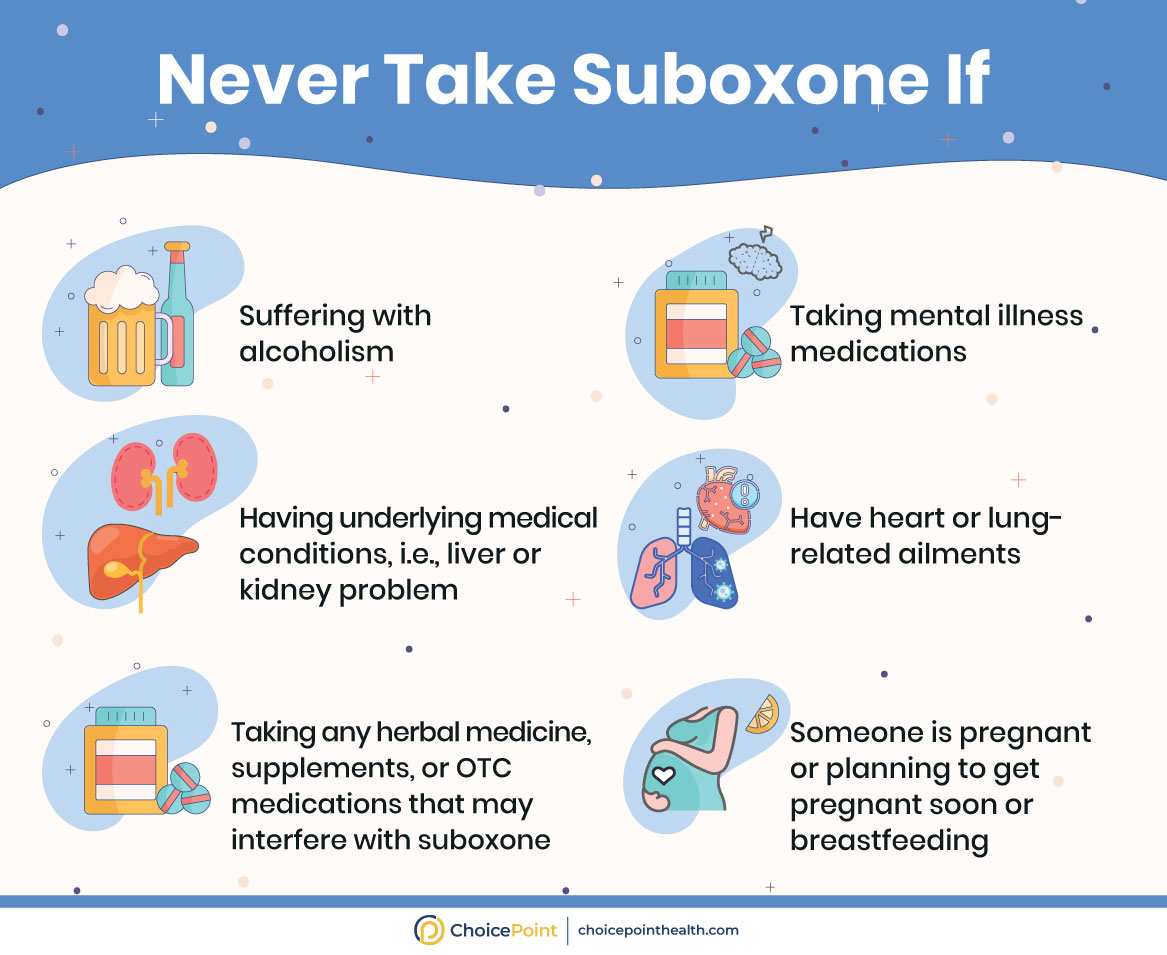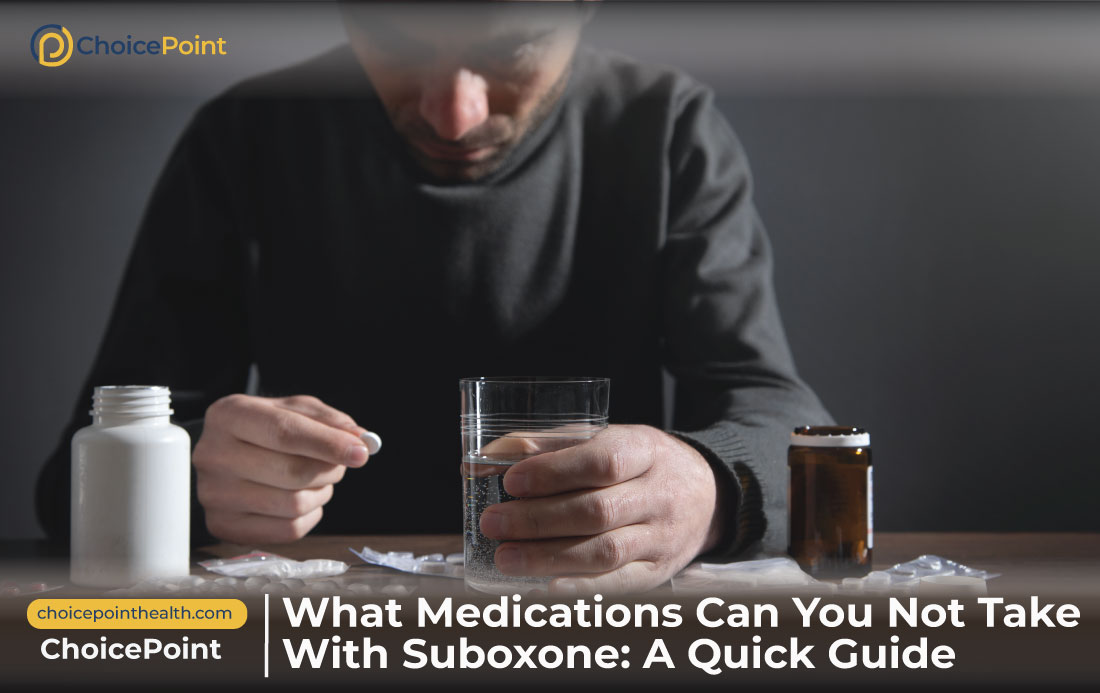Out of 2.5 million people with opioid use disorder in 2021, only 22% were able to receive medications for treatment, including suboxone, naltrexone, and buprenorphine. The scarcity of treatment stats depends on a lack of facilities providing proper treatment guidelines and knowledge, which is why some of you often look online for What Medications Can You Not Take With Suboxone. This blog guides it all!
If you are experiencing suboxone side effects or need help with opioid addiction treatment, Contact ChoicePoint 844.445.2563 drug addiction rehab for immediate advice!
Table of Contents
Suboxone Uses: Why Is It Prescribed?
Suboxone is a Schedule III substance that the FDA approves for the treatment of opioid use disorder. It is a brand name for Buprenorphine, widely used for the treatment of opioid addiction cases such as Oxycontin, Fentanyl, Heroin, Oxycodone, Hydrocodone, etc.
Suboxone works mainly by alleviating withdrawal symptoms from opioids by binding to opioid receptors in the brain and reducing cravings. However, sometimes, a person unintentionally or mistakenly mixes it with other medications, leading to side effects.
Side Effects of Suboxone: When to Stop
Even though suboxone is a good option of medication for opioid use disorder (MOUD), it still has the potential for dependence. It causes severe side effects if not used under clinical guidance or misused. Some of the suboxone side effects include:
- Respiratory depression
- Sleep apnea (breathing issues while sleeping)
- Irritability
- High serotonin
- Fertility problems
- Neonatal abstinence syndrome (NAS)
- Headache
- Nausea and vomiting
- Constipation
- Sweating
- Body pain
Mixing suboxone either intentionally or unintentionally can aggravate these symptoms to an extent that could cause fatality. That is why it is advised to strictly follow DEA-certified practitioner’s guidelines for administering suboxone.
Signs That Suboxone Dose is Too Low
The dose and its effects depend on the use of suboxone, whether for pain or opioid withdrawal. A person might depict some signs that suboxone is ineffective or the dose is too low, such as:
- Tremors
- Opioid cravings
- Sweating
- Opioid withdrawal symptoms
- Gastrointestinal problems
Addiction rehabs: when administering suboxone, make sure to check a person’s condition before they set the dose. That is why a person should always consult one to avoid unpleasant consequences.

Who Should Not Use Suboxone?
What Medications Can You Not Take With Suboxone?
Sometimes, life can be confusing and unpredictable. People under long-term suboxone prescription for OUD often come across other ailments that require medications, such as:
- Antidepressants such as Prozac (fluoxetine) and Nardil (phenelzine)
- Benzodiazepines such as Xanax and Valium
- Antibiotics such as clarithromycin
- Antifungals such as Diflucan
- Seizure medicines phenobarbital
- Tuberculosis medicines rifampin
- St. John’s wort, an herbal plant for depression
- Pain medicines, i.e., morphine
- HIV medications
- Revia or Vivitrol (Naltrexone containing)
These medications interact with suboxone, depressing or increasing its effects, causing severe side effects. Therefore, research recommends taking suboxone only under professional observation, or make sure to tell your doctor if you are taking any medication before beginning suboxone treatment!
Self-Assessment for Your Suboxone Dependence
Check yourself with our DSM-5-oriented self-addiction assessment and discuss your situation with our 24/7 virtual expert about your report. This test is carefully designed to help people struggling to know their condition in using substances that may harm them. 844.445.2563.
Drugs Interactions with Suboxone: Safeguard Your Health
Opioid addiction treatment requires a long run into suboxone, but people with polysubstance use disorders and relapse history often mix suboxone with drugs such as:
A. Suboxone and Alcohol
Alcohol can interact with suboxone, delaying its effect and causing severe side effects such as:
- Unconsciousness
- Breathing problem
- Sleepiness
- Coma
Drinking is something that makes a person unstoppable, and that’s where suboxone and alcohol interaction leads to death. Research also shows more than half of the buprenorphine poisoning deaths were associated with alcohol misuse.
B. Suboxone and Benzo
Combining benzodiazepines and suboxone causes depressed CNS with the following severe symptoms such as:
- Impairment
- Blackout
- Respiratory depression
- Coma
Prolonged misuse of both drugs combined can lead to unavoidable fatal consequences!

Did You Know?: 82% of buprenorphine overdose deaths involved benzodiazepine misuse!

Did You Know?: 82% of buprenorphine overdose deaths involved benzodiazepine misuse!
C. Suboxone and Cocaine or Other Stimulants
Research suggests that cocaine suppresses the effectiveness of suboxone and causes behavioral changes such as polysubstance use disorder and lack of motivation to stay sober. Moreover, taking stimulants such as meth increases the risks of relapse as they stimulate opioid receptors even after suboxone binding, reducing its efficacy.
What To Do if Suboxone Mixed with Other Medications While OUD Treatment
There’s still help out there for people with opioid addiction or if someone has mixed suboxone with some other medication or drug. A certified drug addiction rehab can help through various treatment programs such as:
A. Dual Diagnosis: Treating OUD and Mental Illness
What if someone has a mental illness and opioid addiction together? They would need suboxone and mental illness medication combined, which may aggravate suboxone side effects and complicate the treatment process.
However, a dual diagnosis treatment program from a certified drug rehab can solve the problem by treating co-occurring disorders such as:
- Polysubstance use disorder, i.e., Opioid and alcohol
- Mental illness, i.e., anxiety, depression, PTSD, etc
Such co-occurring disorders often prevent people from getting treatment, and most of the suboxone interventions arise due to the inability of practitioners to treat medical and addiction-related comorbidities.
B. Medication-Assisted Detox With Alternative Medications
One benefit of suboxone is that if someone tries to abuse it, the naloxone part blocks opioid receptors, stopping buprenorphine from binding with it and thus causing unpleasant withdrawal symptoms. Alternate medications could curb the withdrawal and detox process that eliminates all sorts of drugs from the system. Those FDA-approved medications may include:
Other proven methods besides medicated opioid detox include addiction therapies to address underlying issues related to suboxone side effects and opioid addiction.

Know before it’s too late: You should never quit or take suboxone on your own.Research suggests high monitoring throughout suboxone treatment, and it must be tapered off gradually under clinical guidance

Know before it’s too late: You should never quit or take suboxone on your own.Research suggests high monitoring throughout suboxone treatment, and it must be tapered off gradually under clinical guidance
C. Psychotherapy and Counseling for Opioid Use Disorder
For people suffering from severe mental illness and addiction issues, some medications that could interfere with the suboxone process may become unavoidable. In such cases, behavioral therapies are best to treat mental illness and psychological symptoms. They may include:
- Cognitive Behavioral Therapy (CBT) addresses negative behavior and emotions that sometimes lead to mixing substance and opioid addiction.
- Dialectical Behavior Therapy (DBT) alleviates the aggressive mindset that is the first cause of misusing opioids or makes a person relapse when taking suboxone, leading to mishaps.
Moreover, personal development, which assists in controlling and curbing psychosocial factors that come in the way of sober living, is done through individual, family, and group therapies that include positive interactions with friends, families, and peer group fellows in an inpatient setting.
Get Suboxone Experts From ChoicePoint
Since you have learned “What medications can you not take with Suboxone,” you might wonder where to start for all the fuss. ChoicePoint addiction rehab offers all sorts of addiction and mental illness-related treatment with personalized care for students, veterans, expecting mothers, criminal justice, and LGBT. Call Now 844.445.2563 or fill out this form to verify your insurance and curb your suboxone side effects along with opioid addiction!

Julie Says: Suboxone is just an alternative to opioids. It only helps people reduce opioid cravings. Absolute sobriety comes when someone comprehensively goes for addiction treatment that addresses all the underlying causes associated with Opioid use disorder! .

Julie Says: Suboxone is just an alternative to opioids. It only helps people reduce opioid cravings. Absolute sobriety comes when someone comprehensively goes for addiction treatment that addresses all the underlying causes associated with Opioid use disorder! .
Common Queries Regarding Suboxone Interactions
People often ask questions about suboxone, such as:
Does Suboxone Help With Pain?
Yes! Suboxone contains buprenorphine that binds to opioid receptors in the brain, which produces the sensation of pain. So, people with opioid use disorder will have some pain-relieving effects along with alleviated withdrawal symptoms.
What Can You Take for Sleep While on Suboxone?
Suboxone does disturb sleep, and no medications should be used since it may interact with suboxone, causing side effects. Behavioral changes and behavioral therapies can help alleviate insomnia related to suboxone.
What Anxiety Medication Can You Take With Suboxone?
Antianxiety medications such as Valium, Xanax, and Klonopin may be prescribed for people under suboxone treatment but only in an inpatient setting as they interact with suboxone, causing severe complications. Moreover, psychiatrist-oriented psychotherapies help prevent mental illnesses such as anxiety and depression to avoid medication.
How Long Does Suboxone Stay In Your System?
Suboxone can be detected in your system for up to 15 days, depending on body weight, metabolism, gender, and dose consumed. However, The half-life of suboxone is 24-48 hours, and it could extend from person to person.
Can You Take Vitamins With Suboxone?
No! Always tell your consultant before taking suboxone if you are taking any supplements because they may interact with suboxone, causing serotonin syndrome that could aggravate unpleasant psychological symptoms.
Can You Take Antibiotics and Suboxone Together?
No! Some antibiotics, such as clarithromycin and erythromycin, interact with suboxone, increasing their effects on the body more than the required terms and causing unpleasant side effects such as shallow breathing, vomiting, headache, constipation, or even coma, etc.
Medical Disclaimer:
ChoicePoint aims to improve the quality of life for people struggling with substance use disorder and mental health issues. Our team of licensed medical professionals research, edit and review the content before publishing. However, this information is not intended to be a substitute for professional medical advice, diagnosis, or treatment. For medical advice please consult your physicians or ChoicePoint's qualified staff.










Review What Medications Can You Not Take With Suboxone: A Quick Guide.